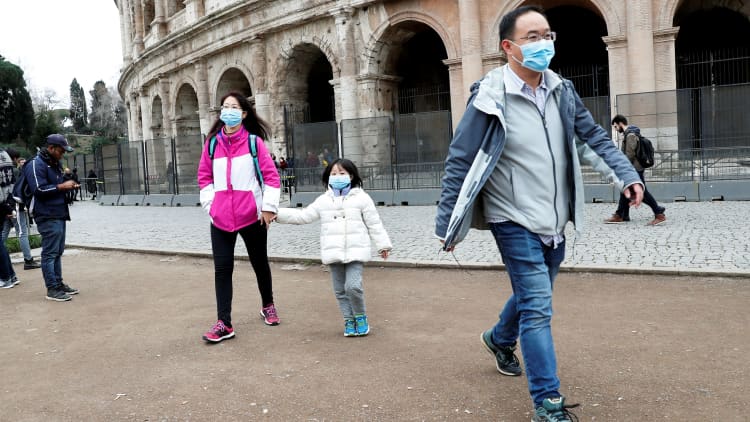Italy is struggling to contain a rapid outbreak of the coronavirus, with new cases confirmed in the capitals of Tuscany and Sicily — the first case south of Rome.
As of Tuesday morning, 283 cases of coronavirus have been confirmed, Italian media reported, including in Florence, the capital of Tuscany, and Palermo, in Sicily. Seven people have died from the virus in the country. As with many victims elsewhere, those who have died in Italy were elderly or had preexisting health conditions.
The number of cases is rising rapidly: On Friday morning, Italy only had 3 confirmed cases before a sharp spike over the weekend. The outbreak was previously contained to the wealthy northern regions of the country but has now spread, with cases recorded in Emilia-Romagna, Piedmont and Lazio.
The outbreak has prompted a blame game between the northern region of Lombardy and the government in Rome.
Prime Minister Giuseppe Conte said the outbreak in Italy — the largest outside of Asia — had been caused by a hospital that had not followed proper protocol. He did not name the hospital but it was presumed to be in the north.

"There was a hotspot and it spread from there in part due to the management of a hospital that was not done entirely according to the prudent protocols that are recommended in these cases," Conte said Monday, Italian news agency ANSA reported.
But an official in the region of Lombardy, where most of the cases (for now, over 200) are concentrated, hit back by calling the government "incapable" and saying Conte's remarks were "groundless and unacceptable," ANSA said.
Meanwhile, opposition politician Matteo Salvini, the leader of the anti-immigration Lega party, said Monday on Facebook that "someone will have to answer to the Italian people about what it was supposed to do and was not done." He said that on Jan. 30, his party had started to request obligatory controls on anyone coming from virus-hit countries but had not been listened to.
'Knocking at the door'
The World Health Organization sent a mission to Italy, saying Monday it was deeply worried about the sudden increase in cases in Italy, as well as in Iran and South Korea. On Tuesday, the WHO warned countries they must be ready for the fast-spreading coronavirus to be "literally knocking at the door."
WHO spokesman Christian Lindmeier, speaking at a news briefing in Geneva, said officials from the organization were meeting in Rome to discuss "pretty strong" measures taken in Italy, Reuters reported.
Italy is trying to contain the spread of the virus in its prosperous northern regions of Lombardy and Veneto, which account for around 30% of the nation's gross domestic product. Italy's economy is already expected to grow only 0.5% in 2020, according to previous Bank of Italy forecasts, and the growth rate is now expected to take a hit.
Earlier Tuesday, the Italian government's deputy economy minister said the European Union could give Italy some leeway on its budget commitments and borrowing given the crisis and its expected economic impact.
Almost a dozen towns in Lombardy and Veneto are under lockdown, public events have been canceled and schools, universities and bars closed; Venice's annual carnival was also shut down early.
In Naples on Tuesday, religious authorities suggested that churchgoers refrain from exchanging the sign of peace, shaking hands or embracing during Mass.
Italian magistrates announced they were opening a probe into the costs of face masks and hand gel that had skyrocketed in the wake of the outbreak, Reuters reported.
With Venice and Milan popular destinations for tourists and business trips, countries around the world — from the Netherlands to Saudi Arabia — have warned against travel to the north or whole of Italy. The U.K. advised anyone returning from the affected areas to quarantine themselves for 14 days. The European Commission has advised its own staff not to travel to Lombardy, advocating the use of teleconferences instead.


